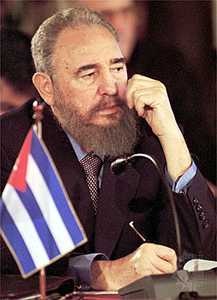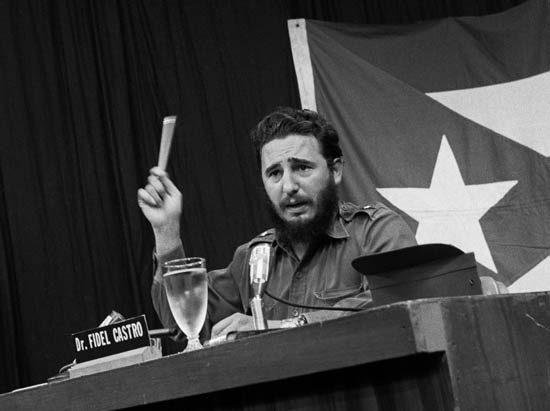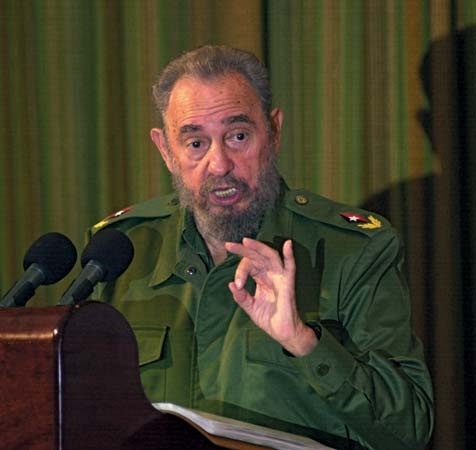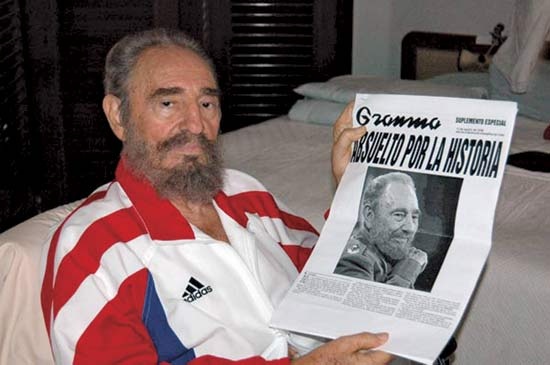Castro, Fidel
political leader of Cuba
in full Fidel Castro Ruz
born Aug. 13, 1926, near Birán, Cuba
 political leader of Cuba (from 1959) who transformed his country into the first communist state in the Western Hemisphere. Castro became a symbol of communist revolution in Latin America. He held the title of premier until 1976 and then began a long tenure as president of the Council of State and the Council of Ministers, handing over provisional power in July 2006 because of health problems and formally relinquishing the presidency in February 2008.
political leader of Cuba (from 1959) who transformed his country into the first communist state in the Western Hemisphere. Castro became a symbol of communist revolution in Latin America. He held the title of premier until 1976 and then began a long tenure as president of the Council of State and the Council of Ministers, handing over provisional power in July 2006 because of health problems and formally relinquishing the presidency in February 2008.Castro was born in southeastern Cuba. His father, Angel Castro y Argiz, an immigrant from Spain, was a fairly prosperous sugarcane farmer in a locality that had long been dominated by estates of the U.S.-owned United Fruit Company. Angel Castro had two children by his first wife and five more children by his cook, Lina Ruz González, whom he later married. Fidel was one of these five children, and Raúl (Castro, Raúl), who later became his brother's chief associate in Cuban affairs, was another.
Fidel Castro attended Roman Catholic boarding schools in Santiago de Cuba and then the Catholic high school Belén in Havana, where he proved an outstanding athlete. In 1945 he entered the School of Law of the University of Havana, where organized violent gangs sought to advance a mixture of romantic goals, political aims, and personal careers. Castro's main activity at the university was politics, and in 1947 he joined an abortive attempt by Dominican exiles and Cubans to invade the Dominican Republic and overthrow Gen. Rafael Trujillo (Trujillo, Rafael). He then took part in urban riots that broke out in Bogotá, Colom., in April 1948.
After his graduation in 1950, Castro began to practice law and became a member of the reformist Cuban People's Party (called Ortodoxos). He became their candidate for a seat in the House of Representatives from a Havana district in the elections scheduled for June 1952. In March of that year, however, the former Cuban president, Gen. Fulgencio Batista (Batista, Fulgencio), overthrew the government of Pres. Carlos Prío Socarrás and canceled the elections.
After legal means failed to dislodge Batista's new dictatorship, Castro began to organize a rebel force for the task in 1953. On July 26, 1953, he led about 160 men in a suicidal attack on the Moncada military barracks in Santiago de Cuba in hopes of sparking a popular uprising. Most of the men were killed, and Castro himself was arrested. After a trial in which he conducted an impassioned defense, he was sentenced by the government to 15 years' imprisonment. He and his brother Raúl were released in a political amnesty in 1955, and they went to Mexico to continue their campaign against the Batista regime. There Fidel Castro organized Cuban exiles into a revolutionary group called the 26th of July Movement.
On Dec. 2, 1956, Castro and an armed expedition of 81 men landed on the eastern coast of Cuba, from the yacht Granma. All of them were killed or captured except Fidel and Raúl Castro, Ernesto (“Che”) Guevara (Guevara, Che), and nine others, who retreated into the Sierra Maestra to wage guerrilla warfare against the Batista forces. With the help of growing numbers of revolutionary volunteers throughout the island, Fidel Castro's forces won a string of victories over the Batista government's demoralized and poorly led armed forces. Castro's propaganda efforts proved particularly effective, and as internal political support waned and military defeats multiplied, Batista fled the country on Jan. 1, 1959. Castro's force of 800 guerrillas had defeated the Cuban government's 30,000-man professional army.
As the undisputed revolutionary leader, Castro became commander in chief of the armed forces in Cuba's new provisional government, which had Manuel Urrutia, a moderate liberal, as its president. In February 1959 Castro became premier and thus head of the government. By the time Urrutia was forced to resign in July 1959, Castro had taken effective political power into his own hands.
 Castro had come to power with the support of most Cuban city dwellers on the basis of his promises to restore the 1940 constitution, create an honest administration, reinstate full civil and political liberties, and undertake moderate reforms. But once established as Cuba's leader he began to pursue more radical policies: Cuba's private commerce and industry were nationalized; sweeping land reforms were instituted; and American businesses and agricultural estates were expropriated. The United States was alienated by these policies and offended by Castro's fiery new anti-American rhetoric. His trade agreement with the Soviet Union in February 1960 further deepened American distrust. In 1960 most economic ties between Cuba and the United States were severed, and the United States broke diplomatic relations with the island country in January 1961. In April of that year the U.S. government secretly equipped thousands of Cuban exiles to overthrow Castro's government; their landing at the Bay of Pigs (Bay of Pigs invasion) in April 1961, however, was crushed by Castro's armed forces.
Castro had come to power with the support of most Cuban city dwellers on the basis of his promises to restore the 1940 constitution, create an honest administration, reinstate full civil and political liberties, and undertake moderate reforms. But once established as Cuba's leader he began to pursue more radical policies: Cuba's private commerce and industry were nationalized; sweeping land reforms were instituted; and American businesses and agricultural estates were expropriated. The United States was alienated by these policies and offended by Castro's fiery new anti-American rhetoric. His trade agreement with the Soviet Union in February 1960 further deepened American distrust. In 1960 most economic ties between Cuba and the United States were severed, and the United States broke diplomatic relations with the island country in January 1961. In April of that year the U.S. government secretly equipped thousands of Cuban exiles to overthrow Castro's government; their landing at the Bay of Pigs (Bay of Pigs invasion) in April 1961, however, was crushed by Castro's armed forces.Cuba also began acquiring weapons from the Soviet Union (Union of Soviet Socialist Republics), which soon became the country's chief supporter and trade partner. In 1962 the Soviet Union secretly stationed ballistic missiles in Cuba that could deliver nuclear warheads to American cities, and in the ensuing confrontation with the United States, the world came close to a nuclear war. The Cuban missile crisis ended when the Soviet Union agreed to withdraw its nuclear weapons from Cuba in exchange for a pledge that the United States would withdraw the nuclear-armed missiles it had stationed in Turkey and no longer seek to overthrow Castro's regime.
In the meantime Castro created a one-party government to exercise dictatorial control over all aspects of Cuba's political, economic, and cultural life. All political dissent and opposition were ruthlessly suppressed. Many members of the Cuban upper and middle classes felt betrayed by these measures and chose to immigrate to the United States. At the same time, Castro vastly expanded the country's social services, extending them to all classes of society on an equal basis. Educational and health services were made available to Cubans free of charge, and every citizen was guaranteed employment. The Cuban economy, however, failed to achieve significant growth or to reduce its dependence on the country's chief export, cane sugar. Economic decision-making power was concentrated in a centralized bureaucracy headed by Castro, who proved to be an inept economic manager. With inefficient industries and a stagnant agriculture, Cuba became increasingly dependent on favourable Soviet trade policies to maintain its modest standard of living in the face of the United States' continuing trade embargo.
Castro remained premier until 1976, when a new constitution created a National Assembly and Castro became president of that body's State Council. He retained the posts of commander in chief of the armed forces and secretary-general of the Communist Party of Cuba—the only legal political party—and he continued to exercise unquestioned and total control over the government. Castro's brother Raúl, minister of the armed forces, ranked second to him in all government and party posts.
Fidel Castro's early attempts to foment Marxist revolutions elsewhere in Latin America foundered, but Cuban troops did eventually serve as proxies for the Soviet Union in various conflicts in less-developed countries. From 1975 to 1989 Cuban expeditionary forces fought in the Angolan civil war on the side of the communistic Popular Movement for the Liberation of Angola. In 1978 Cuban troops assisted Ethiopia in repelling an invasion by Somalia. In the 1980s Castro emerged as one of the leaders of the less-developed world and the nonaligned countries, despite his obvious ties to the Soviet Union. He continued to signify his willingness to renew diplomatic relations with the United States, provided that it end its trade embargo against Cuba. In 1980 Castro released a flood of immigrants to the United States when he opened the port of Mariel for five months. The 125,000 immigrants, including some criminals, strained the capacity of U.S. immigration and resettlement facilities.
In the late 1980s, when the Soviet Union under Mikhail Gorbachev (Gorbachev, Mikhail) began to undertake democratic reforms and eastern European countries were allowed to slip out of the Soviet orbit, Castro retained a hard-line stance, espousing the discipline of communism. The collapse of the Soviet Union in 1991 took him by surprise and meant the end of generous Soviet subsidies to Cuba. Castro countered the resulting economic decline and shortages of consumer goods by allowing some economic liberalization and free-market activities while retaining tight controls over the country's political life.
In late 1993 Castro's daughter sought asylum in the United States, where she openly criticized her father's rule. The following year, economic and social unrest led to antigovernment demonstrations, the size of which had not been seen in Cuba in some 35 years. Shortly thereafter Castro lifted restrictions on those wanting to leave the country, and thousands headed for the United States in the largest exodus since the 1980 Mariel “freedom flotilla.” In 1998 Castro allowed Pope John Paul II to visit Cuba for the first time.
 In 2003 the National Assembly confirmed Castro as president for another five-year term. During that year, the Cuban government arrested dozens of independent journalists and activists in a renewed government crackdown on dissidents, and some 75 activists were convicted for conspiring with the United States to subvert the revolution. The following year, Castro strengthened his alliance with Venezuelan Pres. Hugo Chávez (Chávez, Hugo) by launching the Bolivarian Alternative for the Americas (ALBA; Alternativa Bolivariana para las Américas), a socialist initiative to promote regional commerce, through which Cuba provided health care professionals to Venezuela in exchange for discounted oil.
In 2003 the National Assembly confirmed Castro as president for another five-year term. During that year, the Cuban government arrested dozens of independent journalists and activists in a renewed government crackdown on dissidents, and some 75 activists were convicted for conspiring with the United States to subvert the revolution. The following year, Castro strengthened his alliance with Venezuelan Pres. Hugo Chávez (Chávez, Hugo) by launching the Bolivarian Alternative for the Americas (ALBA; Alternativa Bolivariana para las Américas), a socialist initiative to promote regional commerce, through which Cuba provided health care professionals to Venezuela in exchange for discounted oil. On July 31, 2006, while recovering from surgery, Fidel Castro passed power on a provisional basis to his brother Raúl (Castro, Raúl). It was the first time since the 1959 revolution that he had ceded control. In February 2008, just days before the National Assembly was to vote for the country's leader, Fidel Castro, who had not appeared in public for 19 months, officially declared that he would not accept another term as president. His announcement that he was stepping down was made through a letter addressed to the country that was posted on the Web site of the official Communist Party newspaper, Granma. In part it read, “I do not bid you farewell. My only wish is to fight as a soldier of ideas.”
On July 31, 2006, while recovering from surgery, Fidel Castro passed power on a provisional basis to his brother Raúl (Castro, Raúl). It was the first time since the 1959 revolution that he had ceded control. In February 2008, just days before the National Assembly was to vote for the country's leader, Fidel Castro, who had not appeared in public for 19 months, officially declared that he would not accept another term as president. His announcement that he was stepping down was made through a letter addressed to the country that was posted on the Web site of the official Communist Party newspaper, Granma. In part it read, “I do not bid you farewell. My only wish is to fight as a soldier of ideas.”Additional Reading
Biographies include Tad Szulc, Fidel: A Critical Portrait (1986); Georgie Anne Geyer, Guerrilla Prince: The Untold Story of Fidel Castro (1991); and Robert E. Quirk, Fidel Castro (1993). Lee Lockwood, Castro's Cuba, Cuba's Fidel, rev. ed. (1990) looks at Cuba through the eyes of an American journalist.
- Zorn's lemma
- Zoroaster
- Zoroastrianism
- Zorrilla de San Martín, Juan
- Zorrilla y Moral, José
- Zorzor
- Zoshchenko, Mikhail Mikhaylovich
- Zosimus, Saint
- Zouche, Richard
- Zou Yan
- Zouérat
- Zoysia
- Z particle
- Zrínyi, Miklós
- Zsigmond, Baron Kemény
- Zsigmond Kemény, Baron
- Zsigmond Móricz
- Zsigmondy, Richard
- Zsuzsa Polgar
- Zubatov, Sergey Vasilyevich
- Zubayr, Al-
- Zubin Mehta
- Zubiri, Xavier
- Zuccarelli, Francesco
- Zuccaro, Federico